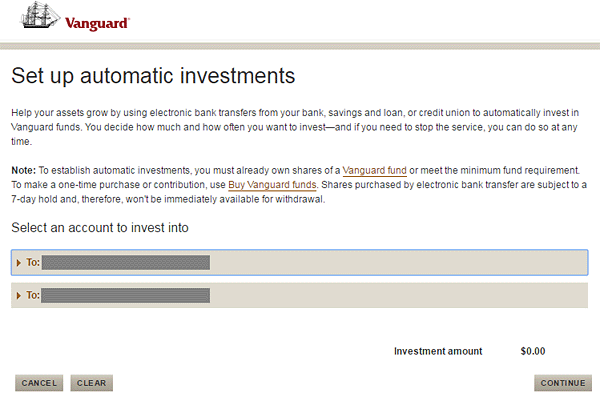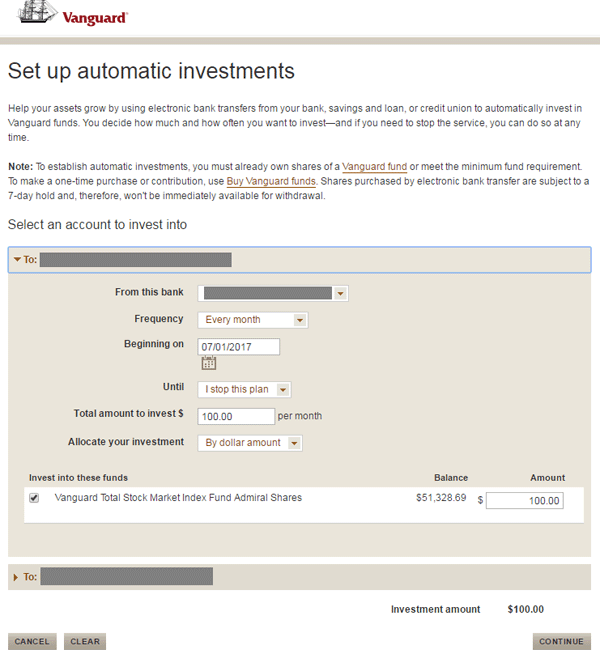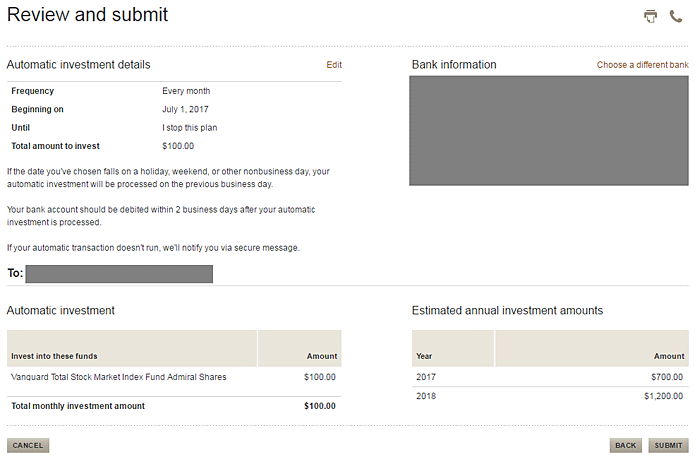
[Note: This is a post I originally wrote for InvestmentZen.com, titled How to Manage Your Money by Automating Your Finances]
Fact: most people budget backwards.
Stop me if this sounds familiar: you make decent money. Every couple of weeks you eagerly await your paycheck, and every couple of weeks you’re shocked at how much Uncle Sam takes out before you ever see that coveted take home pay.
Once your bank account is nice and topped off with the latest, albeit less than advertised, paycheck, it’s time to begin the unfortunately monthly process of writing checks.
To start, a massive chunk gets lopped off to pay the rent or mortgage. The car payment saws out a hunk almost equally as large. Your latest trip to the grocery store brings another dent, right before those smaller miscellaneous bills – electric, gas, television, maybe a subscription service or two – finish off the rest.
You’re left with no choice but to stare in awe at the rubble that’s left of your salary.
This is a classic case of the backwards budget.
The average person pays themselves last, and leaves themselves no choice but to save only the scraps left over. The scraps remaining after everyone else has dipped their hands right into the hard worker’s pockets.
There’s a solution though. There’s a way to flip that budget right side up, and to demand your salary pays its way to making you richer, rather than everybody else.
A way that ensures your paycheck effortlessly, easily, and automatically makes you richer.
Yes, I’m talking about automation. Automation is far and away the easiest method to combat the forces fighting over your dollars, and this post will discuss the strategy.
Why Saving is So Hard
Humans are strange creatures. One of our strangest anomalies is how much more we value things once they become ours.
In psychology this is known as the endowment effect. One famous experiment showed that people who were gifted tickets to a basketball game would only sell those tickets for a price 14 times higher than their previous hypothetical buying price.
On the other hand, money is the one thing that once we have it, we just can’t wait to get rid of it.
Why?
Money is an inherently useless object. The value of money comes from an ability to spend it on stuff. When we don’t spend our money, it feels like a sacrifice. We are giving up our ability to spend.
In that sense, money holds its own endowment effect. An endowment effect far more dangerous than not wanting to sell some basketball tickets.
Short Circuit Your Brain’s Flaws with Automatic Savings
Enter the cheat code of automatic savings.
By automatically saving off the top of your paycheck, you never give the endowment effect of disposable income a chance to kick in.
Saving money before you ever get a chance to see it or think about it doesn’t feel like a loss, because it never feels like our money.
Of course, it is our money. Instead of handing over our dollars to the bottom line of automakers, mortgage lenders, and restaurateurs, we invest these savings in ourselves. In this way, automatic savings are more our money than any amount of instant spending could ever be.
Plus, automating your money bypasses another annoying pitfall of our minds: stress.
No matter how disciplined of an investor you think you are, and no matter how much you promise to put away money every month, it’s unfair to ask us stressed out humans to compete with the stone cold, emotionless machines, who are willing to work for free automatically managing your money.
Believe me, I know. When I first started saving I tried to do everything manually, thinking it wouldn’t make much of a difference. I’m a money blogger, after all – I think and write about money constantly.
And yet, life sometimes just gets in the way, and having access to a big stack of cash can be quite tempting. Before I knew it, I was months off track of my original savings goals.
How to Manage Your Money with Automatic Savings
Here are a few of the easiest ways I’ve found to automate your money and correct those common pitfalls:
1) Automate Your 401(k)
Most 401ks and similar retirement plans require regular contributions directly from your paycheck. This makes signing up for your company’s retirement plan and increasing your automatic contributions one of the best ways to start taking advantage of automation.
Setting up and adjusting your 401(k) is typically accomplished via your employer’s payroll settings or payroll forms. If you’re unsure how to increase your 401(k) contributions, contact your employer’s HR department.
True story: One day, I started a job with a 401(k). The only way to contribute to the 401(k) was through automatic investments each pay period. When I saw how quickly those automatic contributions added up, and how little time, effort, and stress I dealt with as those investments grew, I was blown away.
I started automating as much of my financial life as possible.
2) Automate Your Stock Picking
Rather than spending hours every day pouring over financial statements, you can automate your stock choices by investing in index funds. Index funds automatically choose a mix of companies to represent the entire stock market – a strategy which historically outperforms even the highest paid money managers and stock pickers.
3) Automate Your Index Fund Contributions
Once you’ve automated your stock picking with index funds, you can take it a step further by automating your contributions as well. One of the great advantages of Mutual Funds (versus ETFs) is the ability to choose set dollar amounts to contribute towards your investments at certain frequencies.
With a few clicks of the mouse, you can set yourself up a recurring investment into your index funds.
Let’s say you want to automatically transfer $100 every month from your checking account to your index funds. Here’s a quick example of how easy Vanguard, my favorite investment company, makes this process.
From your account maintenance page, click “Set Up Automatic Investing” or click here. Then,
Step 1: Choose which funds to make your automatic contributions:

Step 2) Fill out a few quick boxes to your liking…

Step 3) and confirm!
Boom, automatic wealth building.
4) Pocket Your Raises
Here’s one of my favorite tricks to automatically keep your investments growing. Whenever you find yourself with the joyous occasion of a raise falling in your lap, take a moment to celebrate. Then, promptly increase your automatic investments enough so that your take home pay stays the same.
This is called pocketing raises, and it’s way cooler than it sounds.
Your life is pretty awesome right now, is it not? So why not keep it awesome, and pocket that raise for yourself?
You’ll thank me in a year or two when looking at your massive bank account.
5) Automatic Bill Pay
If you really want to get your financial life running on auto pilot, set up those bills for autopay. These days, everything from credit cards to electricity bills can be set to auto pay.
Not only does this free you from the annoying task of manually scheduling monthly payments again, but it also ensures you’ll never have to fight your way out of late fees.
Build Yourself an Automatic Wealth Building Machine
By implementing these five steps of automation, you’re giving yourself a wealth building assembly line that covers all the bases. Quickly, easily, and silently.
As your paycheck is automatically shipped to this assembly line, it’s first funneled into the most efficient investments, then delegated to working overtime at making you richer. Then, as your pay increases over time, the shipments of paychecks become larger and larger.
Whenever bills do come up, your wealth building machine automatically handles these with ease, before returning to the far more important work of automatically investing your next paycheck.
All while you lounge around on the sidelines, completely free from the stress of money.


Everything that you said about automation is true (except I can automatically invest in ETFs every week through M1 Finance, but that’s a minor thing). All of my 401K contributions, ROTH IRA, brokerage account, rent, utilities, insurance, etc. are all on auto-pay. The only bill that I actually have to log in and pay myself every month is that I venmo my dad for my cell phone because I’m still on a shared family plan.
I like to think of my wealth-building as a machine and I’m just the inventor/designer. It should run on its own for the most part, but you still have to monitor it regularly. You can’t just walk away. And you have to always be looking for improvements, patches, upgrades, etc. How can I make this machine bigger, faster, more efficient? That’s the fun part.
Love that outlook! So true.
Automation is key! I have my accounts set to max my 401k contributions, Roth IRA, and 5% of my salary into my brokerage account. It leaves a very merger paycheck in my bank account, but it certainly prevents me from overspending. I can live really well off a $1000 a paycheck with the rest paying myself
This is frustrating. I opened a Vanguard Account and selected various recommended funds based on research and looking at their 5 and 10 year average returns, but none of them appear under the Automatic Investing Option, just the Money Market Fund. Turns out all of the broad based funds I selected were ETF’s so Automatic Investing isn’t an option, BUT WHY ? I don’t understand why one is eligible but the other not. Does anyone know ? I wrote to Vanguard but their answer was pretty generic.
I think I just got the answer to my previous question. It looks like Vangard Mutual Funds require a minimum opening balance of (starting at $3000 and up from there). I suspect that’s the differnce…
Automated ETF investing is not supported at Vanguard. ETF’s price can vary during the day (like a regular stock), while a Mutual Fund’s price remains static during the day.
See the similarities and differences between ETF vs. Mutual Fund Investing at Vanguard at this link —-> https://investor.vanguard.com/etf/etf-vs-mutual-fund
Thanks for the link. I also recommend this one 🙂
https://mymoneywizard.com/decide-etf-mutual-fund/
Automation is key to effortlessly save, invest and crush debt, excuses notwithstanding. The only thing I’d add to the above list is with regard to paying down large debts, like the principal amount on home mortgage loans. With a pay raise, add an additional $50 or $100 towards the principal. Continue this for a couple of years (or an amount of your choice)…and watch the principal amount drop ‘effortlessly’. When an opportunity to do a refi comes up, the refi will be for a much lower principal amount compared to the pre-automation principal amount, resulting in lower monthly loan payments too. There’s no point in keeping home loans forever just to deduct the interest from taxes owed…because the money that’s left over due to the absence of periodic debt payments can be redirected (in an automated manner) towards tax-free investment vehicles like IRAs or a 529 account (if applicable)….and thus tax-free growth.
Most brokerages offer fractional share investing.
I would advise utilizing ETFs instead of mutual funds for this purpose as you also benefit from the tax aspect of how ETFs are handled as opposed to mutual funds
The tax concern only applies to brokerages that aren’t Vanguard. Vanguard owns a patent that makes their mutual funds just as tax efficient as their ETFs.
https://mymoneywizard.com/5-reasons-vanguard-funds-best/
Are there any inherent advantages to mutual funds over ETFs if both are offered?
This has been something I have never had a clear answer to and have decided on ETFs myself. The flexibility of fractional shares took away the main benefit mutual funds have held, being that you can buy a dollar amount.
My understanding is that mutual funds are limited in when purchases are made…..however if you automate investing, this is not a big deal.
Appreciate your thoughts!
This article might help —-> https://www.investopedia.com/articles/investing/090215/comparing-etfs-vs-mutual-funds-tax-efficiency.asp
I’m sorry to bother you. But we are 15 days into September and we don’t have your August net worth update. Pls fix, Thx
Coming soon! Just got back from a couple weeks off and will have lots of new posts coming!